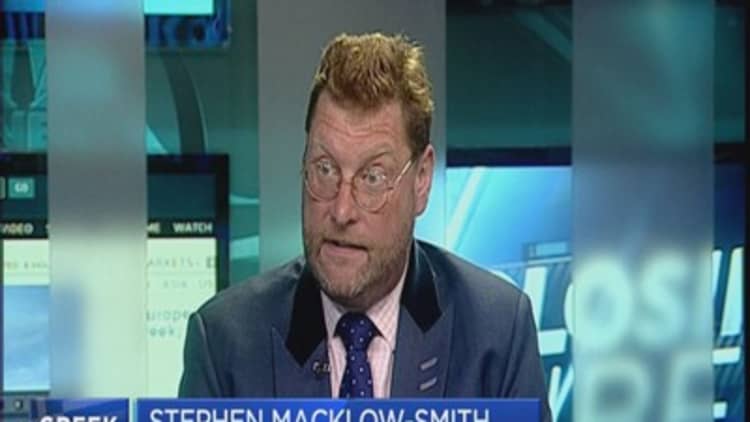Supporters of Greece's bailout terms have taken a wafer-thin lead over the "No" vote backed by the leftist government, hours before a referendum that may determine the country's future in the euro zone, a poll showed.
The opinion poll by the respected ALCO institute, published in the Ethnos newspaper on Friday, put the "Yes" camp on 44.8 percent against 43.4 percent for the No" vote. But the lead was within the pollster's 3.1 percentage point margin of error, with 11.8 percent saying they are still undecided.
With banks shuttered all week, cash withdrawals rationed and commerce seizing up, the vote could decide whether Greece gets another last-ditch financial rescue in exchange for more harsh austerity measures or plunges deeper into economic crisis.
Read MoreGreek crisis: Concerns grow ahead of key vote
It could also determine whether Greece becomes the first country to crash out of the 19-nation European single currency area, membership of which is meant to be irrevocable.
The survey found that 74 percent of Greeks want to stay in the euro, while just 15 percent want to return to a national currency, with 11 percent undecided.
Prime Minister Alexis Tsipras has urged Greeks to reject the "humiliating" terms offered last week by international creditors in a deal that is no longer on the table, and accused lenders of "blackmail" by withholding credit.
As discontent has mounted over long queues for pensions and at cash machines, Tsipras promised voters that banks would reopen as soon as the government clinched a fresh loan from its euro zone partners.
Credit ratings agency Fitch said the banks were already effectively bust and would go to the wall within days unless the European Central Bank increases emergency liquidity assistance to help them cope with a wave of withdrawals.
There has been little time for campaigning but Tsipras is due to address a mass rally of "No" supporters in Athens' central Syntagma Square outside parliament on Friday evening, while "Yes" campaigners plan a rally at the old Olympic Stadium.
The "No" campaign has directed much of its venom at Germany, the euro zone's dominant power and Greece's biggest creditor.
One poster plastered in central Greece shows a picture of German Finance Minister Wolfgang Schaeuble with the slogan: "For five years he's been sucking your blood. Tell him NO now."
The Council of State, Greece's highest administrative court, is to decide on the constitutionality of the referendum at a hearing on Friday. The Council of Europe, a pan-European democracy and human rights watchdog, has said the vote does not meet its minimum standards.
Two Greek citizens are seeking the suspension of the vote as unconstitutional and illegal, arguing that it was called at too short notice, that the constitution bars questions relating to fiscal policy, and that the question is unclear and too complex.
Many Greeks may be unable to cast ballots, either because they are abroad and have to return to the country to vote, or because they do not have the money to return to their home constituencies because of the cash restrictions.
Financial hole

On Thursday, the International Monetary Fund warned that Greece faces a huge financial hole regardless of the outcome of the referendum.
Days after Athens defaulted on an IMF loan repayment, the Fund said Greece needed an extra 50 billion euros over the next three years, including 36 billion from its European partners, to stay afloat. It also needed significant debt relief.
The assessment, in a preliminary draft of the Fund's latest debt sustainability report, underlined the scale of the problems facing Athens, whatever the referendum result.
On Sunday it will fall to the Greek people to decide an issue that their government was unable to settle in months of acrimonious negotiations with their European partners.
"People have lost it completely. And it's all the fault, 100 percent, of all the politicians. They are to blame for the situation we are in now," said pensioner Thanos Stamou.
Greece's European partners have made clear they regard the vote as a choice of whether Greeks want to stay in the euro.
"We are asking them to vote with their eyes open and think hard about all the consequences of a 'No' vote, which could lead Greece to leave the euro zone," French Prime Minister Manuel Valls said on the sidelines of an economic summit in Lyon.
The comment reflected the fear of many in the euro zone that a Greek exit would change the nature of a 15-year-old currency union intended to be unbreakable.
If voters back a bailout plan the government has scorned, Tsipras and Finance Minister Yanis Varoufakis have made clear they would quit. That would lead to a scramble to either try to put together a national unity government to negotiate a loan deal or call new elections by September.
Already, Tsipras' coalition is crumbling as a succession of deputies from the right-wing Independent Greeks, his junior partners, have backed the 'Yes' vote.
Varoufakis, who alienated many euro zone colleagues with his economic lectures and outspoken style, said in a blog post that the IMF's report vindicated Greece's demands to put debt relief at the centre of the negotiations.
"Puzzlingly, all this fine research by the good people at the IMF suddenly evaporates when IMF functionaries coalesce with their ECB and the European Commission colleagues in order to impose upon our government their chosen policies," he said.

